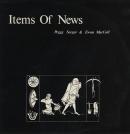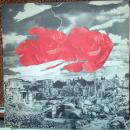In our Durham County I am sorry for to say,
That hunger and starvation is increassing every day;
For the want of food and coals we know not what to do,
But with your kind assistance we will stand the struggle through.
I need not state the reason why we have been brought so low,
The masters have behaved unkind, as everyone will know;
Because we won't lie down and let them treat us as they like,
To punish us they've stopt their pits and caused the present strike.
The pully wheels have ceased to move, which went so swift around,
The horses and the ponies too are brought from underground;
Our work is taken from us now, they care not if we die,
For they can eat the best of food and drik the best when dry.
The miner and his marra too, each morning have to roam,
To seek for bread to feed the hungry little ones at home;
the flour barrel is empty now, their true and faithful friend,
Which makes the thousands whish today the strike was at an end.
We have done our very best as honest working men,
To let the pits commence again we've offered to them ten.
the offer they will not accept, they firmly do demand
Thirteen and a half per cent, or let the collieries stand.
Let them stand or let them lie, to do with them as they choose,
To give them thirteen and a half, we ever shall refuse,
They're always willing to receive, but never inclined to give.
Very soon they won't allow a working man to live.
(With tyranny and capital they never seem content,
Unless they are endeavouring to take from us per cent.
If it was due, what they request, we willingly would grant,
We know its not, therefore we cannot give them what they want)
The miners of Northumberland we shall for ever praise,
For being so kind in helping us those tyrannisisng days;
We thank the other counties too, that have been doing the same,
For every man who hears this song will know we're not to blame
That hunger and starvation is increassing every day;
For the want of food and coals we know not what to do,
But with your kind assistance we will stand the struggle through.
I need not state the reason why we have been brought so low,
The masters have behaved unkind, as everyone will know;
Because we won't lie down and let them treat us as they like,
To punish us they've stopt their pits and caused the present strike.
The pully wheels have ceased to move, which went so swift around,
The horses and the ponies too are brought from underground;
Our work is taken from us now, they care not if we die,
For they can eat the best of food and drik the best when dry.
The miner and his marra too, each morning have to roam,
To seek for bread to feed the hungry little ones at home;
the flour barrel is empty now, their true and faithful friend,
Which makes the thousands whish today the strike was at an end.
We have done our very best as honest working men,
To let the pits commence again we've offered to them ten.
the offer they will not accept, they firmly do demand
Thirteen and a half per cent, or let the collieries stand.
Let them stand or let them lie, to do with them as they choose,
To give them thirteen and a half, we ever shall refuse,
They're always willing to receive, but never inclined to give.
Very soon they won't allow a working man to live.
(With tyranny and capital they never seem content,
Unless they are endeavouring to take from us per cent.
If it was due, what they request, we willingly would grant,
We know its not, therefore we cannot give them what they want)
The miners of Northumberland we shall for ever praise,
For being so kind in helping us those tyrannisisng days;
We thank the other counties too, that have been doing the same,
For every man who hears this song will know we're not to blame
inviata da Bartleby - 11/5/2011 - 13:06
×
![]()








Nell’album “Second Shift” del 1958, con Peggy Seeger.
Compare anche nel successivo “British Industrial Ballads” del 1961.
Come Trimdon Grange, un’altra canzone scritta da Thomas “Tommy” Armstrong (1848-1920), poeta e cantautore nativo della contea di Durham, nel nord-est inglese. Tommy da bambino aveva sofferto di una grave forma di rachitismo che lo costrinse alle stampelle e che gli impedì di scendere nelle gallerie a scavar carbone, il destino di quasi tutti gli altri uomini del posto. Ma la sua vita fu comunque indissolubilmente legata alla miniera perché Tommy divenne “The Pitman's Poet”, il poeta dei minatori, dei quali raccontava in versi la vita, le lotte, gli scioperi, le tragedie del lavoro molto frequenti e spesso con bilanci di perdita di vite umane a due o tre cifre. Armstrong non fu solo un poeta ma anche un “entertainer” con grandi doti improvvisative, molto richiesto a feste e party e sempre disponibile ad esibirsi per raccogliere fondi per aiutare le famiglie dei minatori morti e a sostegno degli scioperi.
Armstrong scrisse questa canzone sulla melodia della ballata popolare “Castles in the Air”, conosciuta anche con il titolo di “Ball of Kerrimuir”, in occasione del grande sciopero del 1892 che paralizzò l’estrazione del carbone dell’intera contea di Durham. In quell’occasione i minatori, già da tempo organizzati nella National Union of Mineworkers, persero la battaglia ma quello sciopero continua ancora oggi ad essere uno degli eventi principali celebrati nell’annuale “Durham Miners' Gala”, o semplicemente "The Big Meeting", organizzato dal sindacato dei minatori inglesi fin dal 1871.